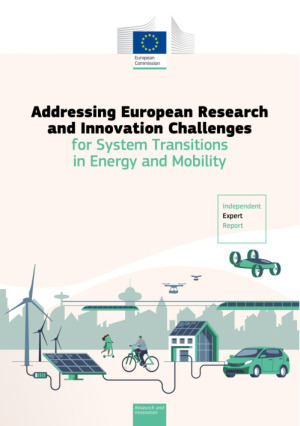
Brussels, 12 November 2024 — As global challenges accelerate, the European Commission is setting out a comprehensive strategy for a sustainable and competitive future. A landmark reflection paper, Addressing European research and innovation challenges for systemic transitions in energy and mobility, sets out an ambitious roadmap to guide Europe’s transition to climate neutrality by 2050. This in-depth paper, authored by renowned experts, highlights the need for rapid action in research and innovation (R&I) to maintain European competitiveness, ensure energy security and achieve social fairness in the low-carbon transformation.
Contextual changes and challenges
The paper highlights that Europe needs to adapt to four significant changes. First, low-carbon technologies such as solar panels and electric vehicles are advancing globally, making it necessary for the EU to step up its efforts to support their deployment. Second, the intense global race for technological supremacy, especially against the US and China, is raising concerns about competitiveness. China, in particular, has become a powerhouse in the production of clean technologies. Third, rising geopolitical tensions, exemplified by the vulnerabilities of energy supply highlighted by the conflict in Ukraine, underline the need for energy security. Finally, social acceptance of green policies is increasingly contested and requires a fair and inclusive approach.
Key areas of focus for innovation
The paper proposes a strategic vision for Europe’s energy and mobility systems, presenting nine high-impact innovation pathways. These include:
- Systems integration: leveraging digital technologies to align renewable energy, electricity grids and urban mobility solutions.
- Infrastructure innovations: building advanced networks, expanding electric vehicle charging networks and integrating hydrogen infrastructure.
- Decarbonising electricity: emphasising solar and wind energy to ensure economic competitiveness and sustainability.
- Efficient heating: implementing heat pumps and electrothermal storage in buildings and industries.
- Electric vehicles and batteries: expanding battery technology to improve grid flexibility and energy efficiency.
- Biofuels and hydrogen: focusing on sustainable fuels for transport while recognising cost challenges.
- Social innovations and mobility as a service (MaaS): encouraging behavioural changes, shared mobility models and digital transformations in urban transport.
A competitive and safe Europe
The European Commission calls for strategic investments in research and innovation to compete globally. With Europe lagging behind China and the US in private R&D, the report calls for measures to boost industrial policy, protect supply chains and ensure access to critical raw materials. Ambitious EU plans, such as the Green Deal industrial plan and the Critical Raw Materials Act, aim to increase domestic production and reduce dependence on non-European sources. However, balancing these goals with affordability and public support remains a key challenge.
Social acceptance and fairness
Achieving Europe’s climate goals requires societal buy-in. The paper addresses concerns such as income inequality, affordability of green technologies and fair treatment of communities affected by transitions. Initiatives such as the Just Transition Fund are highlighted, but experts stress the need for deeper engagement and support to foster a shared vision of a sustainable future.
Strategic policy recommendations
The Commission stresses that research and innovation cannot operate in isolation; it must be aligned with broader policy frameworks. Policy recommendations include increasing public funding for research and innovation, promoting collaborations between startups and established players, and strengthening resilience against supply chain disruptions. A call is also made for institutional reforms and cross-sectoral coordination to ensure security, sustainability and competitiveness. Marc Lemaitre, Director General for Research and Innovation, says “stakes are high, but with determined action and strategic innovation, Europe can secure its place as a global leader in sustainability, while benefiting its citizens and the planet.”
This reflection paper will undoubtedly stimulate debate across the EU, laying the foundations for bold action in the next Framework Programmes and transforming the European energy and mobility landscape.